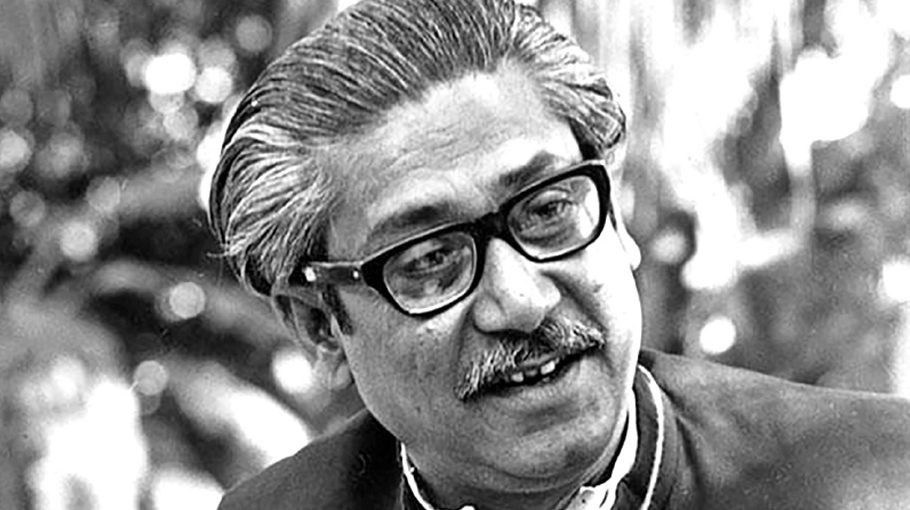Their Mojibor their unforgettable Sheikh Shaheb
In the hallowed councils of the world, Bangabandhu was a colossus striding across the moments that constituted the embroidered fabric of history

On Bangabandhu Sheikh Mujibur Rahman’s 40th death anniversary, you remember the larger-than-life man he was. He inhabits our consciousness in all his largeness of form and substance, and not just in the figurative sense. Tall for a Bengali, he gave us to understand that in him were all those traits which underline the making of a political giant. His height mattered. So did his convictions. Think about it, think about all the other significant political figures who, in the course of our modern history, have influenced our evolution into where we happen to be today.
Bangabandhu falls within that category. And yet, he breaks free of all those earlier stars and forms, within and by himself, a world apart. Of all the historical icons we have had cause to observe in our political ambience, only Bangabandhu stayed steadfast in purpose.
That element you call compromise, or a shifting of the ground, was not part of his nature.
And that made all the difference. It was made clear to Bangabandhu towards the end of the 1950s that Bangalis needed to make their way out of Pakistan. And remember that he came of a generation which, in the 1940s, went all the way into making sure that the Lahore Resolution of 1940 was implemented in the interest of the muslims of India.
That Sheikh Mujibur Rahman could break out of the communal mould, that he was beginning to question the very basis of the country in whose creation he, like millions of other young men, had once taken immense interest, was an early hint of the greatness he was destined for.
The path to that greatness was clearly laid out in 1966, when he overrode every other concern to inform the ruling classes of Pakistan that it was time to reinvent the state through his Six Point program for regional autonomy.
Bangabandhu was a man of huge self-esteem and an abundance of confidence. At the height of the Agartala conspiracy case trial in 1968, he coolly told a western journalist that the Pakistani authorities would not be able to keep him incarcerated for more than six months. Note that he was on trial for sedition, possibly headed towards execution or a very long term in prison. In any case, he was free in seven months.
Bangabandhu was a man of huge self-esteem and an
abundance of confidence. At the height of the Agartala
conspiracy case trial in 1968, he coolly told a western
journalist that the Pakistani authorities would not be
able to keep him incarcerated for more than six months
As he prepared to fly to Rawalpindi in February 1969, to attend the round-table conference called by President Ayub Khan, he quipped: “Yesterday a traitor, today a hero.” In Rawalpindi, he spurned Ayub’s offer of the prime ministership of Pakistan. Always a man who went by the norms of political transparency, he emphatically told Zulfikar Ali Bhutto in January 1971 that the December 1970 elections had given his party the right to govern Pakistan.
The People’s Party had its place marked out -- it was to be on the opposition benches. Bangabandhu’s principled stand in national politics was matched by his diplomatic convictions abroad.
He took Saudi Arabia’s King Faisal to task over the latter’s negative remarks on Pakistan’s break-up in 1971. He put Yakubu Gowon in his place when the Nigerian lamented the weakening of Muslim Pakistan through the rise of a secular Bangladesh. He asked Indira Gandhi, in blunt fashion, when she on taking her soldiers back home from Bangladesh.
Bangabandhu was our own. The mores and social norms we have grown up with were all exemplified in him. His smile radiated confidence and instilled courage in us. His sense of humour remains unmatched.
He never forgot a face and always remembered names. His laughter reverberated across the room and beyond. He was always filling the room with his presence. When he met complete strangers, he made them feel they had known him all their life.
When he found himself in the company of academics, he did not forget that these were men who deserved his unqualified respect. Alone among the great men we have known, he drew respect from the intellectual classes and the more humble citizens alike.
Across this land, men of letters speak of Bangabandhu with reverence. Peasants and rickshaw-pullers have always known him as their very own “Mojibor” or as their unforgettable “Sheikh.”
In the hallowed councils of the world, Bangabandhu was a colossus striding across the moments that constituted the embroidered fabric of history.
Enayetullah Khan is Editor in Chief, Dhaka
Courier and UNB



